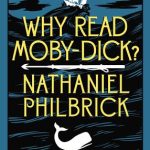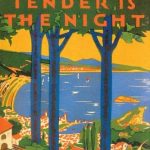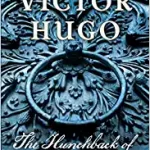I will not put Herman Melville’s Moby Dick (published 1851) on my favorite books list because it’s simply not a favorite novel (I shudder at each description of whale blubber). And yet, I must give Moby-Dick a solid five stars out of five for the rich reading experience it provides. I simply loved reading it. Much as other great works in world literature, such as War and Peace and Hamlet or (maybe) even East of Eden, Moby Dick gives innovative depth and breadth to a majestic subject, creating a universal epic of good and evil in the guise of a novel about something that may otherwise seem insignificant.
Moby-Dick is about much more than a whaling ship’s voyage, the biology of a whale, or even an insane whale-ship captain’s revenge on a whale. Reading Moby-Dick is a cultural experience, and the novel itself is a marvel in the detail Melville provides to create a composite picture of the mid-nineteenth century America. In addition, despite the clear setting (it could not be the same story without the whale hunting and whale fact digressions), the story is a universal one: fate versus choice, good versus evil, sanity versus insanity, God versus man.
First, although we no longer rely on whale oil for our light, our reliance on petroleum seems to echo the dependence on whale oil. Maybe collecting petroleum is not as dangerous as whale hunting was, but there is something familiar in the narrator’s injunction:
For God’s sake, be economical with your lamps and candles! not a gallon you burn, but at least one drop of man’s blood was spilled for it. (Chapter 45)
The narrator Ishmael argues that whales are too large and populous to become extinct (see Chapter 105) and yet, today we know that in the 1970s, whales were quite close to extinction because of our dependence on whale hunting for oil (for power, then for cosmetics). We, too, seem to take petroleum for granted in our life.
Ahab also is a universal character, a maniac that, as was suggested in Philbrick’s book, can be interpreted to be an Adolf Hitler or a Osama Bin Laden. “Is Ahab, Ahab? Is it I, God, or who, that lifts this arm?” he wails toward the end of the novel (Chapter 132). He feels compelled to continue in his insane quest, and the others are dragged along with him. Despite his insanity, the crew is solidly behind him (he has quite a lot of charisma, besides the fact that they are stuck with him on a whaling boat for three years and he’s the leader). Only Starbuck seems to grasp the end that is coming to them.
Melville conveys his symbolic story with subtle humor throughout. Melville seems to question strict religious upbringing as he ponders humanity. For example, in the beginning of the novel, Ishmael feared Queequeg, his strange bedfellow, because he was a “cannibal.” Soon, however, he realized Queequeg was a good man. He even joins Queequeg in his strange worship (Queequeg joined him at his Christian church; why not return the favor?).
I say, we good Presbyterian Christians should be charitable in these things, and not fancy ourselves so vastly superior to other mortals, pagans and what not, because of their half-crazy conceits on these subjects. There was Queequeg, now, certainly entertaining the most absurd notions about Yojo and his Ramadan;—but what of that? Queequeg thought he knew what he was about, I suppose; he seemed to be content; and there let him rest. All our arguing with him would not avail; let him be, I say: and Heaven have mercy on us all—Presbyterians and Pagans alike—for we are all somehow dreadfully cracked about the head, and sadly need mending. (Chapter 17)
And then later:
Cannibals? who is not a cannibal? I tell you it will be more tolerable for the Fejee that salted down a lean missionary in his cellar against a coming famine; it will be more tolerable for that provident Fejee, I say, in the day of judgment, than for thee, civilized and enlightened gourmand, who nailest geese to the ground and feastest on their bloated livers in thy pate-de-foie-gras. (Chapter 65)
On the whole, I loved his analogies surrounding cannibals, humans, and sharks. Fleece, the old cook, provides a great lecture to the sharks on Stubb’s orders:
“Your woraciousness, fellow-critters, I don’t blame ye so much for; dat is natur, and can’t be helped; but to gobern dat wicked natur, dat is de pint. You is sharks, sartin; but if you gobern de shark in you, why den you be angel; for all angel is not’ing more dan de shark well goberned. Now, look here, bred’ren, just try wonst to be cibil, a helping yourselbs from dat whale. Don’t be tearin’ de blubber out your neighbour’s mout, I say. Is not one shark dood right as toder to dat whale? And, by Gor, none on you has de right to dat whale; dat whale belong to some one else. I know some o’ you has berry brig mout, brigger dan oders; but den de brig mouts sometimes has de small bellies; so dat de brigness of de mout is not to swaller wid, but to bit off de blubber for de small fry ob sharks, dat can’t get into de scrouge to help demselves.” (Chapter 64)
And also:
Oh, man! admire and model thyself after the whale! Do thou, too, remain warm among ice. Do thou, too, live in this world without being of it. Be cool at the equator; keep thy blood fluid at the Pole. Like the great dome of St. Peter’s, and like the great whale, retain, O main! in all seasons a temperature of thine own. (Chapter 68)
Ah, I can’t begin to quote all the beautiful phrases and images Melville created. Here are just a few more.
…damp, drizzly November in my soul… (Chapter 1)
Father Mapple was in the hardy winter of a healthy old age; that sort of old age which seems merging into a second flowering youth, for among all the fissures of his wrinkles, there shone certain mild cleams of a newly developing bloom – the spring verdure peeping forth even beneath February’s snow. (Chapter 8 )
Is it that by its indefiniteness it shadows forth the heartless voids and immensities of the universe, and thus stabs us from behind with the thought of annihilation, when beholding the white depths of the milky way? Or is it, that as in essence whiteness is not so much a colour as the visible absence of colour; and at the same time the concrete of all colours; is it for these reasons that there is such a dumb blankness, full of meaning, in a wide landscape of snows—a colourless, all-colour of atheism from which we shrink? (Chapter 42)
But even so, amid the tornadoed Atlantic of my being, do I myself still for ever centrally disport in mute calm; and while ponderous planets of unwaning woe revolve round me, deep down and deep inland there I still bathe me in eternal mildness of joy. (Chapter 84)
She was Rachel, weeping for her children, because they were not. (Chapter 128)
Can you read Moby-Dick without reading the chapters about whales’ anatomy, whale blubber, the history of whaling, the whale hunt, and so forth? Well, you can read the rest of it, but you will not have read Moby-Dick. The whole is greater than the parts. Do I love it? No, I did not. But I certainly loved reading it. Melville created a novel like no other, and it is well worth a slow, careful read.





…I feel like I can really, really read Moby Dick without reading the chapters on whale’s blubber etc. Don’t you think it counts the same, given that I’ve read all the whale-blubber chapters TWICE, to give the book a third try but this time only read the interesting parts? Cause I think I would like it better that way.
Jenny » lol, whatever works for you. As Philbrick says in his book, even reading SOME of Moby Dick has an impact. Much as I too don’t like whale blubber, I do think those chapters are an integral part of the novel as a whole, though. It wouldn’t be the same without them. But I may skip or skim in the future now too… I’ve also gone through it twice. I do understand!!!
Great review. This is a tough book to get through, but so worth it in the end. I haven’t read it for years, but I put it on my Classics Club list, so I’ll be reading it again sometime over the next five years. Your review makes me want to re-read it sooner rather than later.
Heather » yep, I am really glad I revisited it! Enjoy your reread too.
I’m new here, but enjoying the selection of books you’ve got. I recently reviewed Moby-Dick as well, and I scored it full marks as well. It’s not a totally easy book, but honestly, it pushed my mind to the edge of what it’s capable of imagining and grasping.
neal » well put.
I read this earlier this year and it was such a difficult book. There were parts and descriptions that I absolutely loved and then there were others that I just struggled with.